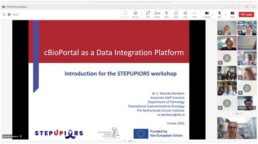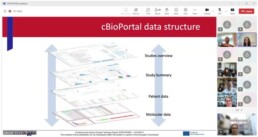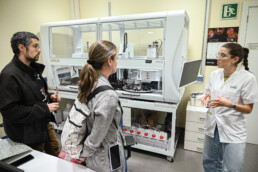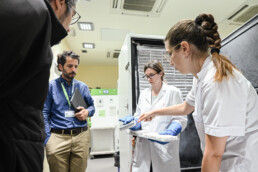STEPUPIORS training: Online cBioPortal Workshop for Users and Data Loaders
STEPUPIORS online training “Online cBioPortal Workshop for Users and Data Loaders” was held on June 4, 2025 and was attended by 27 participants from IORS, NKI-AVL, FRCB-IDIBAPS and BRFAA/NKUA.
This interactive workshop was focused on cBioPortal, a powerful open-source platform for exploring and visualizing multidimensional cancer genomics data. It provided a great synergy of theoretical background and hands-on practice, perfect for both researchers exploring cancer data and data managers preparing datasets for integration.
Workshop highlights:
Overview of cBioPortal as a data integration platform
In-depth explanation of supported data formats
Hands-on data loading into a local cBioPortal instance
Insight into real-world FAIR data management challenges and solutions
A big thank you to the speakers and training organizer from the NKI-AVL Dr. ir. Mariska Bierkens, Dr. Adria Closa Mosquera, Iris Huitink and Dr Remond Fijneman, and to all the participants and future cBioPortal data loaders.
AFALynch Association Visits IDIBAPS to Explore Advances in Colon and Rectal Cancer Research
On Friday, May 16, IDIBAPS welcomed representatives from the Association of Families Affected by Lynch Syndrome (AFALynch).
During their visit, the AFALynch delegation had the chance to gain direct insight into the research being conducted by Sergi Castellví-Bel, head of the IDIBAPS group on Genetic Predisposition to Gastrointestinal Cancer, and Francesc Balaguer, head of the Gastroenterology Department at Hospital Clínic and researcher in the IDIBAPS group on Gastrointestinal and Pancreatic Oncology. The group also toured the laboratories and the biobank, where biological samples for research are processed and preserved.
One of the highlights of the visit was learning about the STEPUPIORS project. It was discussed that our initiative aims to establish a European network of institutions dedicated to rectal cancer research. The visitors were informed that the project aims to identify prognostic and predictive biomarkers by analyzing the molecular profiles of patients at both diagnosis and throughout treatment. It was concluded that the project’s findings are expected to inform evidence-based treatment decisions, refine therapeutic protocols, reduce side effects and healthcare costs, and ultimately improve patient quality of life.










